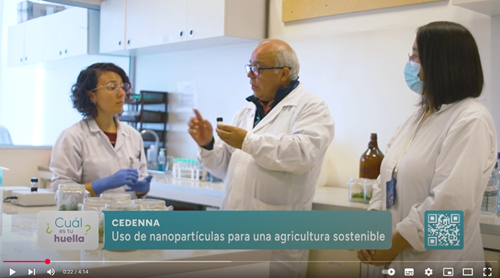An innovative strategy for addressing the challenges of sustainable agriculture was presented in the latest episode of the program ¿Qué es tu huella? (What's Your Footprint?), broadcast by TVN and Canal 24 Horas, which highlights the work led by Dr. Gustavo Zúñiga, a professor at the Faculty of Chemistry and Biology of the University of Santiago de Chile (USACH) and a researcher at the Center for Nanoscience and Nanotechnology (CEDENNA).
The research involves the development of plant nanoparticles through a green synthesis process, using extracts from native and Antarctic plants such as boldo, maqui, and quillay. These nanoparticles allow for the generation of natural, chemical-free fertilizers and pesticides that leave no residue and can be applied even post-harvest.
"Our approach in the agricultural field is based on the development of a biotechnological tool that allows us to produce plant material efficiently and sustainably," Dr. Zúñiga explained during the report.
The team has worked for years to perfect in vitro culture protocols for plant species that possess active ingredients capable of filtering ultraviolet radiation, opening up possibilities for agricultural, cosmetic, and dermatological applications.
"One of the plants that grows in Antarctica, which we have managed to produce under laboratory conditions, accumulates substances that filter UV radiation. With this knowledge, it is possible to generate formulations that are stable, efficient in control, and have a low environmental impact," the researcher explained.
The process of obtaining nanoparticles is carried out through a technique known as "green synthesis," which eliminates the use of toxic reagents, allowing for the creation of products that are safer for the environment and people.
"This synthesis is environmentally friendly. What we do is take the plants we grow in the laboratory, macerate them with hot water, and extract compounds with high reducing power, which allow us to generate nanoparticles, primarily iron oxide," Zúñiga said.
These nanoparticles have proven effective as nanofertilizers and nanopesticides, with specific applications in the post-harvest period, preventing the growth of fungi and prolonging the shelf life of fruits and vegetables without leaving toxic residues.
"Many of these products can be used post-harvest. Because they are natural, they leave no residue and prevent the growth of fungi while the fruit is stored," he emphasized.
Finally, the researcher praised the contribution of nanotechnology to advancing cleaner agriculture, aligned with the country's environmental challenges:
“Working with cleaner agriculture, not only in terms of products but also in terms of the environment, is clearly a solution that can impact a country like ours, which relies heavily on agriculture,” he concluded.
The full episode is available on the official What's Your Footprint? YouTube channel:
? https://www.youtube.com/watch?v=r_BjAEfH_W4








